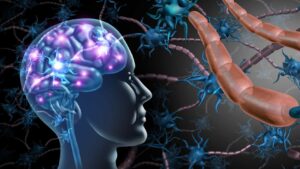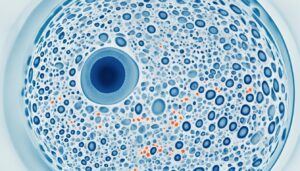Did you know that electrolyte imbalance can affect millions of people worldwide and lead to a wide range of symptoms and health issues? Whether it’s due to dehydration, excessive sweating, or certain medical conditions, maintaining the right balance of electrolytes is crucial for optimal bodily function.
In this comprehensive guide, we will provide you with safe and easy methods how to fix electrolyte imbalance at home. From natural remedies to hydration practices, we’ll help you restore electrolyte balance and alleviate the symptoms associated with this condition.
Key Takeaways:
- Electrolyte imbalance affects millions of people worldwide and can lead to various symptoms and health issues.
- It is important to maintain the right balance of electrolytes for optimal bodily function.
- In this comprehensive guide, we will provide you with safe and easy methods to fix electrolyte imbalance at home.
- Natural remedies, hydration practices, and lifestyle adjustments can help restore electrolyte balance.
- By addressing electrolyte imbalance, you can alleviate symptoms and improve overall well-being.
Understanding Electrolyte Imbalance Symptoms
Recognizing and understanding the symptoms of electrolyte imbalance is crucial for effective home treatment. Electrolytes, such as sodium, potassium, calcium, and magnesium, play a vital role in maintaining proper functioning of the body’s cells, muscles, and organs. When there is an imbalance in these electrolytes, various symptoms can arise, indicating the need for intervention to restore balance.
Recognizing Dehydration and Its Effects
Dehydration is one of the primary causes of electrolyte imbalance. When the body lacks sufficient water, it disrupts the delicate balance of electrolytes. Common signs of dehydration include:
- Extreme thirst
- Dry mouth and tongue
- Dark-colored urine
- Fatigue and weakness
- Dizziness or lightheadedness
In addition to these symptoms, dehydration can have various effects on the body, such as:
- Impaired kidney function
- Reduced blood volume and circulation
- Increased risk of heat-related illnesses
- Difficulty regulating body temperature
Identifying Warning Signs of Imbalanced Electrolytes
Imbalanced electrolytes can manifest through a range of symptoms that may vary depending on the specific electrolyte affected. Common warning signs of imbalanced electrolytes include:
- Muscle cramps and spasms
- Irregular heartbeat or palpitations
- Nausea, vomiting, or diarrhea
- Headaches or migraines
- Changes in mood or mental status
It is important to pay attention to these warning signs as they indicate an imbalance that needs to be addressed for overall well-being.
The Impact of Electrolyte Disruption on Vital Organs
Electrolyte imbalance can have profound effects on vital organs, including the heart, muscles, and brain. When electrolyte levels are too high or too low, it can disrupt the normal functioning of these organs, leading to serious health complications. For example:
- Low levels of potassium or magnesium can cause irregular heart rhythms.
- Imbalances in calcium can affect muscle contractions and coordination.
- Disruptions in sodium levels can impact brain function and cause neurological symptoms.
Understanding the impact of electrolyte disruption on vital organs highlights the importance of maintaining proper electrolyte balance for optimal health.
How To Fix Electrolyte Imbalance at Home
In this section, we will discuss safe and effective methods to fix electrolyte imbalance at home. When faced with electrolyte imbalance, it is important to address the issue promptly and restore electrolyte balance in order to maintain optimal health. Fortunately, there are several natural remedies and home remedies available that can help restore electrolyte balance without the need for medical intervention. Let’s explore some DIY electrolyte imbalance remedies that you can easily try at home.
One of the simplest ways to fix electrolyte imbalance at home is by increasing your intake of electrolyte-rich foods and beverages. Incorporating foods such as bananas, avocados, spinach, and coconut water into your diet can replenish essential electrolytes and promote balance in the body.

Another effective remedy is homemade electrolyte drinks. These can be made by combining water with ingredients like sea salt, lemon juice, and a natural sweetener, such as honey or maple syrup. These drinks not only help rehydrate the body but also provide the necessary electrolytes for restoring balance.
Additionally, consuming foods high in potassium, magnesium, and calcium can also aid in fixing electrolyte imbalance at home. Incorporate foods such as oranges, almonds, yogurt, and leafy greens into your diet to provide your body with the essential nutrients it needs.
Lastly, practicing proper hydration is key to maintaining electrolyte balance. Make sure to drink an adequate amount of water throughout the day and replenish fluids lost through sweat during physical activity. Adding a pinch of salt to your water can help replace electrolytes lost during intense workouts.
By following these simple home remedies, you can effectively fix electrolyte imbalance and restore balance in your body. Remember to consult a healthcare professional if your symptoms persist or worsen.
Hydration Practices to Address Imbalance at Home
Proper hydration is essential for maintaining electrolyte balance in the body. In this section, we will discuss effective hydration practices to address electrolyte imbalance at home. By strategizing fluid intake throughout the day and incorporating hydrating foods into your diet, you can promote optimal electrolyte levels and overall well-being.
Strategizing Fluid Intake Throughout the Day
Developing a fluid intake strategy is key to maintaining proper hydration and electrolyte balance. Follow these fluid intake strategies to ensure optimal hydration:
- Drink water regularly throughout the day, aiming for at least 8 glasses (64 ounces) of water.
- Consider setting reminders or using hydration tracking apps to stay on track with your fluid intake.
- Increase your fluid intake during physical activities, hot weather, or when experiencing excessive sweating.
- Include herbal teas, infused water, or low-sugar electrolyte beverages as refreshing alternatives to plain water.
Remember, adequate fluid intake is essential for maintaining electrolyte balance and supporting overall health.
Integrating Hydrating Foods into Your Diet
In addition to fluid intake, incorporating hydrating foods into your diet can help replenish electrolytes naturally. Hydrating foods are rich in water content and provide essential nutrients. Consider adding the following hydrating foods to your meals and snacks:
- Watermelon
- Cucumber
- Celery
- Strawberries
- Oranges
- Leafy greens like spinach and lettuce
These hydrating foods not only contribute to overall hydration but also provide vitamins, minerals, and antioxidants that support electrolyte balance and promote overall health.
Understanding When Extra Fluids Are Necessary
There may be situations where extra fluids are necessary to address electrolyte imbalance. If you experience any of the following conditions, consider increasing your fluid intake:
- Intense physical activity or exercise
- Prolonged exposure to heat or high temperatures
- Illnesses that cause vomiting or diarrhea
- Conditions that increase fluid loss, such as fever or excessive sweating
During these times, it’s important to replenish lost fluids to maintain electrolyte balance and prevent dehydration. Be mindful of the signs of electrolyte imbalance and consult a healthcare professional if you have any concerns.

| Hydrating Foods | Water Content (%) |
|---|---|
| Watermelon | 92% |
| Cucumber | 96% |
| Celery | 95% |
| Strawberries | 91% |
| Oranges | 87% |
| Spinach | 92% |
These hydrating foods, along with proper fluid intake, can play a vital role in restoring electrolyte balance and supporting optimal health.
Natural Foods That Help Restore Electrolyte Balance
Certain natural foods are rich in electrolytes and can help restore balance in the body. Including these foods in your diet can provide essential electrolytes and aid in restoring electrolyte balance.
Here are some top natural foods that are high in electrolytes:
- Bananas: These fruits are a great source of potassium, an important electrolyte that helps regulate fluid balance in the body.
- Coconut Water: Known for its hydrating properties, coconut water is naturally rich in potassium, sodium, and magnesium.
- Leafy Greens: Vegetables like spinach and kale are packed with minerals like magnesium and calcium, which are essential for electrolyte balance.
- Avocado: This creamy fruit is not only delicious but also contains potassium and magnesium, making it a great choice for restoring electrolyte balance.
- Oranges: Citrus fruits like oranges are a good source of potassium and magnesium, as well as vitamin C, which can aid in electrolyte absorption.
These natural foods can be easily incorporated into your diet to help restore electrolyte balance naturally. Including a variety of these foods in your meals and snacks can provide the necessary electrolytes to keep your body in optimal condition.

Role of Lifestyle in Maintaining Electrolyte Harmony
Lifestyle factors play a significant role in maintaining electrolyte balance in the body. Through various daily activities and habits, we can influence the regulation of electrolytes and promote optimal functioning. In this section, we will explore three key aspects of lifestyle that impact electrolyte balance: exercise, stress, and sleep patterns.
Exercise and Electrolyte Regulation
Regular physical activity not only benefits overall health but also plays a vital role in electrolyte regulation. During exercise, the body loses electrolytes, primarily through sweat. Replenishing these electrolytes is essential to maintain the balance necessary for optimal bodily functions.
When engaging in any physical activity, especially intense or prolonged exercise, it is crucial to hydrate properly and replenish electrolytes. Hydration before, during, and after exercise is essential to ensure adequate fluid and electrolyte levels. Consuming sports drinks or electrolyte-rich beverages can effectively help restore and maintain electrolyte balance.
Stress and Its Effect on Electrolyte Levels
Stress, both physical and emotional, can have a significant impact on electrolyte levels. The body’s stress response triggers the release of stress hormones, which can disrupt the balance of electrolytes. In particular, cortisol, the primary stress hormone, can affect electrolyte regulation.
To mitigate the effects of stress on electrolyte levels, it is important to practice stress management techniques such as relaxation exercises, deep breathing, and mindfulness. Additionally, maintaining a balanced diet and staying hydrated can help support optimal electrolyte balance during stressful periods.
Sleep Patterns and Their Role in Electrolyte Balance
Quality sleep plays a crucial role in maintaining electrolyte balance. During sleep, the body goes through various processes of restoration and regulation, including electrolyte balance. Disruptions in sleep patterns can impact the body’s ability to maintain proper electrolyte levels and can lead to imbalances.
Establishing regular sleep patterns, practicing good sleep hygiene, and ensuring adequate sleep duration are essential for supporting optimal electrolyte balance. Additionally, maintaining a balanced diet, avoiding caffeine and stimulating substances before bed, and creating a relaxing sleep environment are important steps to promote restful sleep and electrolyte harmony.
By prioritizing regular exercise, implementing effective stress management techniques, and adopting healthy sleep patterns, we can maintain optimal electrolyte balance and support overall well-being.
Safe Use of Salt and Sugar in Balancing Electrolytes
Salt and sugar are commonly used in balancing electrolytes in the body. However, it is important to understand how to safely and optimally utilize these substances for maintaining electrolyte balance. By practicing moderation in the consumption of sodium and glucose, navigating natural sweeteners and refined sugars, and determining the optimal salt intake, you can effectively stabilize your electrolyte levels.
Moderation and Sources of Sodium and Glucose
Moderation is key when it comes to sodium and glucose intake. While both are essential for proper bodily functions, excessive consumption can lead to electrolyte imbalances. To achieve moderation, it is recommended to be mindful of sodium-rich foods such as processed snacks, canned soups, and fast food meals. Likewise, monitoring sugar intake from sugary beverages, desserts, and processed foods can help maintain glucose balance.
Navigating Natural Sweeteners and Refined Sugars
When it comes to sweetening foods and beverages, it is important to make informed choices. Navigating natural sweeteners like honey, maple syrup, and stevia can provide alternative sources of sweetness without the negative impacts of refined sugars. These natural options can help regulate glucose levels while still satisfying your taste buds.
Optimal Salt Intake for Electrolyte Stability
Optimizing salt intake is crucial for maintaining electrolyte stability. While excessive sodium intake can lead to imbalances, insufficient intake can also disrupt electrolyte levels. It is recommended to follow the guidelines provided by reputable health organizations, which suggest a moderate salt intake of around 2,300 milligrams per day for adults. However, individual salt requirements may vary depending on factors such as activity levels, health conditions, and personal preferences. Consulting with a healthcare professional can help determine the optimal salt intake for your specific needs.

When to Seek Professional Medical Assistance
While home remedies can often address electrolyte imbalance, there are instances where professional medical assistance may be necessary. It is crucial to understand when to seek medical help for electrolyte imbalance and when it is important to consult a healthcare professional.
Severe electrolyte imbalances can have significant consequences on your health and require immediate attention. If you experience any of the following symptoms, it is recommended to seek professional assistance:
- Severe muscle weakness or cramps
- Irregular heartbeat or palpitations
- Confusion or difficulty thinking clearly
- Seizures
- Severe nausea or vomiting
Additionally, if your symptoms do not improve with home remedies or if they worsen over time, it is important to consult a healthcare professional. They can assess your condition and provide professional guidance tailored to your specific needs.
It is worth noting that certain individuals are at a higher risk of electrolyte imbalances, such as those with chronic conditions, older adults, or athletes. If you fall into any of these categories and experience symptoms of electrolyte imbalance, it is recommended to seek medical help promptly.
Remember, your health is a priority, and seeking professional assistance can ensure the most appropriate and effective treatment for electrolyte imbalance.
| Symptoms | When to Seek Medical Help |
|---|---|
| Severe muscle weakness or cramps | Immediate medical attention is recommended. |
| Irregular heartbeat or palpitations | Consult a healthcare professional promptly. |
| Confusion or difficulty thinking clearly | Seek medical help to assess your condition. |
| Seizures | Immediate medical attention is necessary. |
| Severe nausea or vomiting | Consult a healthcare professional to determine the appropriate course of action. |
Conclusion
In conclusion, addressing electrolyte imbalance at home can be done safely and easily by implementing the strategies and remedies discussed in this comprehensive guide. By recognizing the symptoms of electrolyte imbalance, such as dehydration and warning signs of imbalanced electrolytes, individuals can take proactive steps towards restoring balance within their bodies. Proper hydration practices, including strategizing fluid intake throughout the day and incorporating hydrating foods into the diet, are crucial for maintaining electrolyte balance. Additionally, understanding the role of lifestyle factors, such as exercise, stress management, and sleep patterns, can further contribute to electrolyte harmony.
Throughout the article, we have highlighted the importance of moderation when using salt and sugar to balance electrolytes, and provided guidance on optimal intake for electrolyte stability. While home remedies can often be effective, it is essential to know when to seek professional medical assistance. If symptoms persist or worsen, it is advised to consult a healthcare professional for further evaluation and guidance.
Fixing electrolyte imbalance at home can be achieved through a combination of natural remedies, healthy lifestyle practices, and the proper use of salt and sugar. By paying attention to the body’s needs and implementing these strategies, individuals can restore electrolyte balance and promote overall well-being. Remember to prioritize your health and well-being, and consult with a healthcare professional when necessary.
FAQ
What are the symptoms of electrolyte imbalance?
Common symptoms of electrolyte imbalance include fatigue, muscle cramps, irregular heartbeat, weakness, dizziness, and confusion.
How can dehydration affect electrolyte balance?
Dehydration can lead to electrolyte imbalances as it reduces the body’s fluid levels, disrupting the concentration of electrolytes.
What are the warning signs of imbalanced electrolytes?
Warning signs of imbalanced electrolytes include excessive thirst, dry mouth, frequent urination, and dark-colored urine.
What organs can be impacted by electrolyte disruption?
Electrolyte disruption can have an impact on vital organs such as the heart, muscles, and nervous system.
How can electrolyte imbalance be fixed at home?
Electrolyte imbalance can be fixed at home using natural remedies and home remedies that help restore electrolyte balance in the body.
What are some hydration practices to address electrolyte imbalance at home?
Strategies for fluid intake throughout the day, incorporating hydrating foods into your diet, and knowing when extra fluids are necessary can help address electrolyte imbalance.
Which natural foods can help restore electrolyte balance?
Natural foods such as bananas, avocados, coconut water, and leafy green vegetables are high in electrolytes and can aid in restoring balance.
How does lifestyle impact electrolyte balance?
Exercise affects electrolyte regulation, stress can alter electrolyte levels, and sleep patterns play a role in maintaining electrolyte balance.
What is the safe use of salt and sugar in balancing electrolytes?
Moderation and sources of sodium and glucose, navigating natural sweeteners and refined sugars, and understanding the optimal salt intake are important for maintaining electrolyte stability.
When should I seek professional medical assistance for electrolyte imbalance?
It is important to seek professional medical assistance for electrolyte imbalance if symptoms persist, worsen, or if you have underlying health conditions.




